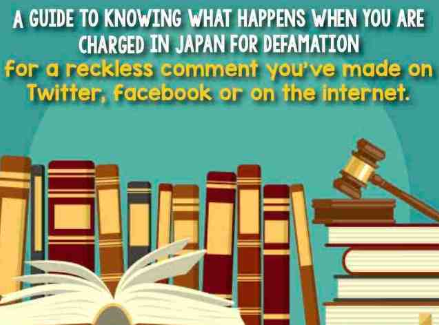- Belgium comes to Yamashita Park
- Residential Villa in Phuket Entices Remote Workers With Long-Stay Rates
- Rare pieces of French glass art at the Mirai Museum of Art
- Feast on fresh fish and seafood at the 2024 ‘Sakana’ Festival
- Would you like to ride in a Louis Vuitton gondola lift?
- Naked Snow Aquarium
- Festive lights at Yomiuriland will get you feeling the holiday vibes
Reckless comments on social media cost money. Don’t get arrested.
When Tokyo resident Jeremy (not his real name to protect his privacy) posted a reckless review on social media about a restaurant he went to, it cost him 300,000 yen in damages for defamation charges brought against him by the restaurant owner.
Mindless tweeting costs money, so be very careful. One consequence that may arise from posting reckless comments on Facebook or Twitter, is being slapped with an order to pay the defamed, a hefty sum. Given the potential disruption to your daily life and dent on your savings if you were to get involved in a case and lose, arm yourself with knowledge on Japan’s law on defamation. Every country has its own unique laws and Japan is no different. This can be more difficult than it sounds, but being aware of what you are up against in such circumstances will help you stay out of unnecessary trouble.
That is the message coming from Very Very Best Law Offices in Japan that posted a guide on its website on how to deal with potentially defamatory posts on social media.
Here’s a summary of what the law office has published on its website. It is a bit long but hang in there.
WHAT TO DO WHEN YOU ARE CHARGED WITH DEFAMATION
(Interpretation, damages, and how to deal with it)
“A” anonymously writes on XXX social media platform that “B” was “cheating.” “B” reports “A” to the police to make a defamation claim resulting in the police contacting “B”. (* More on the definition of defamation and penalties later.) Make sure you haven’t had any previous or ongoing criminal offense.
If an alleged defamer is charged with defamation and convicted in a trial, he or she may be sentenced to imprisonment for up to three years or ordered to pay a fine of up to ¥ 500,000.
(Defamation)
Article 230. A person who publicly reveals facts and defames a person is liable to imprisonment for up to three years or a fine of not more than 500,000 yen, regardless of facts.
Article 230 of the Penal Code
Defamation is an act that may damage the honor (social reputation) of another person. For a defamation to be valid, a proof that an openly offensive act backed by facts demeaning the reputation of the claimant, has to be established.
In other words, if there is an unspecified number of ‘third party’, such as people inside a company, or internet audience backing up a claim against offender, he or she will be liable for making a statement damaging someone’s reputation. However, if the statement is a proven fact and serves the public interest or is for the public good, it is not punishable under the law. (Example: Media exposing a fraud.) *The Japanese legal term for defamation is “Meiyo Kison“(名誉毀損). The kanji characters literally translate to “loss of honor or value.”
Article 230-20 “If the act set forth in paragraph 1 of the preceding Article relates to facts in which the purpose is deemed solely for public interest, it shall be judged according to its veracity. If there is a solid proof, there will be no penalty.”
Reference: Article 230 of the Penal Code
Tips on defamation in criminal cases
(1) The time limit for a complaint is six months after identifying the offender.
A complaint is subject to a time limit. The validity of a defamation complaint expires six months after the victim has been identified as the culprit.
(2) Defamation is not a crime if there are no charges. Defamation does not make you guilty of a criminal offense unless a charge was actually made by the victim against you.
For example, if you write on the Internet that “so and so is taking drugs” and harms the victim’s social reputation, it will not be a crime unless a criminal complaint is filed.
(3) The difference between a ‘defamation’ and an ‘insult’ lies in whether there is or isn’t factual indication.The difference between an insult and defamation is based on whether there are specific facts available confirming actual harm to complainant’s social status.
For example, if you insult someone with “Baka-Aho-Boosu” (Stupid-moron-ugly) without showing facts to back it up in public, it is an insult.
(insult)
Article 231. Anyone who insults a person publicly without declaring facts shall be detained or imprisoned.
Reference: Article 231 of the Penal Code
(4) Whether defamation or “defamation of character” has reduced someone’s social reputation in economic terms
Defamation of character, unlike defamation, is established only when a person’s “credibility” is devalued.
“Credibility” is understood to refer to social trust linked to the economic value of a person, so its difference from defamation is whether or not a reduction in economic value arises as a result of the harm on a person’s reputation.
For example, if a company whose business performance is increasing was criticized publicly on the Internet as: ““So and so” Company failed to raise funds and is about to go bankrupt.” That would be a defamation of character.
(Credibility damage and obstruction of business)
Article 233 (1) A person who spreads false rumors or used false countermeasures to impair the credibility of a person or impede his/her business is punishable by imprisonment with labor for a period not more than three years or a fine not exceeding 500,000 yen.
Reference: Article 233 of the Penal Code
Defamation
Here is a summary of defamation cases.
(1) Writing on an internet platform that “so and so” was taking drugs.
Writing on the internet or social media platform with the ” ‘name‘ of a person who lives in “place” takes drugs,” is an act of defamation. Whether it is true or false,”taking drugs” defames a person. In addition however, it doesn’t constitute a crime if there is a valid proof that the act was made out of public interest and that a proof backing up the claim is factual and that the person has not had any prior prosecution.
(2) Someone says “so and so” was cheating.
Rumors between friends and acquaintances claiming ” ‘name‘ is cheating on a friend’s wife” is also defamation. (3) Posting a bad word on Twitter referring to a person with his or her name on it.
Putting out a name on tweets is also defamation. Twitter is an open space viewed and used by an unspecified number of people and therefore, could count as devaluing a person’s social reputation.
Flow of arrest for defamation
When arrested for defamation, the following procedures are taken.
– Arrest by police
Police investigation (by interrogation) is carried out (detention lasting up to 48 hours after arrest)
– You could either be released after police investigation for insufficient evidence, or ordered to pay fines, or handed over to a prosecutor for “further investigation” of the case.
– Investigation by prosecutors is carried out and, in principle, could last up to 24 hours.
– The prosecutor makes a request to the court for further investigation. If the court approves it and a decision is made, prolonged detention starts (10 days + extension of another 10 up to 20 days). You will either be indicted or not charged. If you are prosecuted, the trial date will be issued in about one month, after which you will ultimately be declared ‘guilty’ or ‘acquitted’.
What to do if you are arrested for defamation
There are ways to avoid punishment for being arrested on defamation charges.
(1) Negotiate
Even if you have been arrested, you can talk the victim into dropping the criminal complaint. If he or she agrees, there won’t be a criminal offense and penalties. If you have been arrested for defamation, it is important to negotiate with the victim to see if you can come to an agreement.
However, victims often do not want to meet with an offender, so it is better to ask a third party and a lawyer who knows how to mediate from a legal standpoint.
(2) Consult a lawyer
Lawyers have experience in negotiating successfully with the party involved. If you are arrested by the police for defamation, consult your lawyer immediately. If you ignore the police’s comments during interrogation that do not suit you, talking to a lawyer will help you deal with the police properly, give you advice on withdrawal of criminal charges.
Therefore, if you have been arrested by the police, we recommend that you consult your lawyer as soon as possible.
Civil Liability
The penalty charges for defamation runs anywhere between 500,000 and 1,000,000 yen.
However, if there is a significant damage to the complainant’s social reputation as a result of defamatory acts, compensation may exceed 1,000,000 yen.
The following case examples of defamation constitute damages of over one million yen:
– Fatal occupational damages
– Reminding victim of his/her involvement in a crime
– Repeatedly tarnishing the victims’ honor
– Using mass media to tarnish the victim’s honor
If your actions fall under any of the above, it may involve a large settlement.
Conclusion
Defamation is a serious offense that could land you in jail for up to three years or be ordered to pay a fine of up to 500,000 yen. Wild and offensive remarks are often being floated around on the internet. It is not uncommon to see people getting arrested even if the acts they have been charged for were meant to be a joke. Contact a lawyer immediately if you have been arrested for defamation so you can address issues with police, work and previous criminal offenses.













